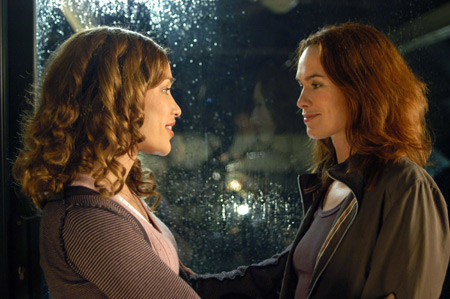Imagine Me & You
 Granted, immediately upon the success of “Brokeback Mountain” I surmised that every studio would be chomping at the bit to exploit every conceivable plot involving a gay relationship. If you think for even a second that “Imagine Me and You” comes remotely close to capitalizing on the success of “Brokeback Mountain,” then you’re not just mistaken — you’ve missed every American romantic comedy in…
Granted, immediately upon the success of “Brokeback Mountain” I surmised that every studio would be chomping at the bit to exploit every conceivable plot involving a gay relationship. If you think for even a second that “Imagine Me and You” comes remotely close to capitalizing on the success of “Brokeback Mountain,” then you’re not just mistaken — you’ve missed every American romantic comedy in…

Granted, immediately upon the success of “Brokeback Mountain” I surmised that every studio would be chomping at the bit to exploit every conceivable plot involving a gay relationship. If you think for even a second that “Imagine Me and You” comes remotely close to capitalizing on the success of “Brokeback Mountain,” then you’re not just mistaken — you’ve missed every American romantic comedy in the past twenty-five years. Instead of being a ripoff of Annie Proulx’s roughnecked romance, it’s a ripoff of every heterosexual romantic comedy you’ve ever seen.
At the public screening I attended, there were plenty of gay couples, male and female. It would appear the studio went to great lengths to market the advance screening to the “gay community.” That’s unfortunate, because they’re possibly going to view this film as an affront to them. No, it’s just an affront to cinema. Every individual, every theme, every relationship, every idea that permeates the ears of studio executives in Hollywood runs risk of being boiled down to a pedestrian stereotype. This film contains no exceptions.
Consider the formula: Boy meets girl. Boy is already engaged. Boy falls in love. Boy has doubts. Boy and girl engage in ambivalent psychological footsie to propagate artificial sexual tension. Boy says it must end. Boy was wrong. Boy relents and gives in to his desires. Boy dumps spouse and gets with the flame. Now, replace the boy with a girl and there you have it — this movie in a nutshell.
To be sure, the peripheral characters are somewhat funny and charming, on the surface. Rachel’s friend’s daugther, Henrietta (Boo Jackson)—she says everyone calls her “H”, as in “Jesus H. Christ”—is the precocious child who asks plenty of odd (but endearingly bright) questions and plays the role of Innocent Child Philosopher with nuggets of wisdom to offer the adults. There’s Rachel’s parents: Tessa (Celia Imrie), the overbearing mother, and Ned (Anthony Head), the perpetually-inebriated father who doesn’t amount to anything except when he’s needed near the end, when all seems lost, for emotional support and paternal wisdom to do right for her what he, surprise, feels he failed at in his own marriage.
However abysmally routine these characters and their roles may seem, the actors do bring a shred of substance and humor to them. Consider Coop (Darren Boyd), the friend of the groom, Hector (Matthew Goode, who incidentally plays the also-cheated-upon Tom Hewett in “Match Point”). Yes, Coop plays the role of the fetishist comic, replacing every other noun with a more tangential and lascivious one — but his manner fits it perfectly. Following several failed attempts to woo Luce (Lena Headey) even after he discovers she’s gay (“Anyone can change teams,” he says), Coop advises Rachel that Luce (Lena Headey) is gay “as a tennis player.”
Rachel clearly fancies Luce but the film never gets into her character’s head beyond the superficial and exploitative PG-rated lust. Ask the MPAA, not me, how it is that a film that goes only as far as girl-girl kissing earns an “R” when “Firewall,” in which people get shot, beaten and pick-axed to death, gets a “PG-13” rating. Granted, I don’t expect a whole lot of relationship development in the initial stages of a romance. But the lust here, for what it’s worth, isn’t all that interesting, either. Not that I think lust needs to be graphic to be interesting. I’ve seen more sexual chemistry and tension between Johnny Depp and Jack Davenport in “Pirates of the Caribbean.”
The romance develops when, on Luce’s birthday, she and Rachel go out for a night of Dance Dance Revolution. Rachel asks Luce about the symbolic meanings of various flowers. Rachel’s favorite flower is the “Lily.” Luce says it means “I dare you to love me.” I’ll try and remember that next time I attend a wake.
It would have been funnier to use their romance as really a backdrop for what happens between Tessa and Ned, because there’s potential for more depth, a touch of bittersweet and a rich finish of dark humor to these characters. Rachel and Luce are just pretty cardboard cutouts shuffled about in a plot that’s supposed to manipulate us emotionally, and barely succeeds at even that. But first-time director Ol Parker has perhaps a long way to go before he develops a sense for understanding how to capitalize on where the talent really lies. Piper Perabo is not a versatile enough actress to do anything more complicated than a standard Jennifer Aniston cookie-cutter treatment, though with a British accent. Did every British actress turn down the lead… on the grounds of preserving integrity, I presume?
Imagine me and you seeing a different movie.
 Imagine Me & You • Dolby® Digital surround sound in select theatres • Running Time: 94 minutes • MPAA Rating: R for some language and sexual material. • Distributed by Fox Searchlight
Imagine Me & You • Dolby® Digital surround sound in select theatres • Running Time: 94 minutes • MPAA Rating: R for some language and sexual material. • Distributed by Fox Searchlight